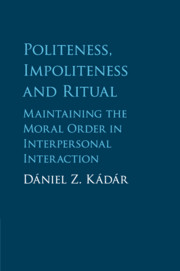Book contents
- Frontmatter
- Contents
- List of Figures
- List of Tables
- Acknowledgements
- Preface
- 1 Introduction
- Part I Ritual and (Im)Politeness: The Basic Relationship
- 2 Ritual: Its Definition, Typology, and Relational Role(s)
- 3 Ritual and Politeness Research
- 4 Ritual Action and (Im)Polite Evaluation: The Basic Relationship
- Part II Ritual, (Im)Politeness, and Moral Aggression
- Notes
- References
- Index
3 - Ritual and Politeness Research
from Part I - Ritual and (Im)Politeness: The Basic Relationship
Published online by Cambridge University Press: 13 April 2017
- Frontmatter
- Contents
- List of Figures
- List of Tables
- Acknowledgements
- Preface
- 1 Introduction
- Part I Ritual and (Im)Politeness: The Basic Relationship
- 2 Ritual: Its Definition, Typology, and Relational Role(s)
- 3 Ritual and Politeness Research
- 4 Ritual Action and (Im)Polite Evaluation: The Basic Relationship
- Part II Ritual, (Im)Politeness, and Moral Aggression
- Notes
- References
- Index
Summary
Introduction
Chapter 2 illustrated that ritual has an important and complex relationship with (im)politeness even if one examines ritual action in a simplistic way. This raises a question, namely how the area of ritual research should be positioned in the field of politeness research. This is not a straightforward question, considering the disciplinary differences that exist between ritual and politeness research (see Chapter 1): while ritual research is a strongly multidisciplinary area and pragmatics has had relatively little weight in ‘mainstream’ ritual studies, politeness research is an essentially pragmatics-driven area, even though it merges pragmatics with some other areas as well. Therefore, there seems to be an interdisciplinary gap between the research of these phenomena, and it is necessary to fill this gap before moving on to a more complex examination of the interface between ritual and (im)politeness in Chapter 4. Studying this disciplinary question reveals various key aspects of ritual, such as its relationship with other phenomena such as conventional practices of interpersonal interaction.
In Section 3.2, I take the politeness researcher's position and revisit previous politeness theories, which, in my view, are highly relevant to ritual theory. I argue that ritual (along with convention) has been present in the field, in particular in cross-cultural (im)politeness research, even though it has never been explicitly identified within the scope of ritual research. The most important study in this area was written by the Japanese expert Sachiko Ide (1989) and is now counted as a ‘classic’ of politeness research; similarly to Brown and Levinson (1987), Ide's study has been broadly criticised in the field. In the present inquiry, I devote particular attention to this work, by revisiting Ide's (1989) arguments, as well as a number of politeness theoretical problems that these arguments imply, through the lenses of ritual research. Instead of criticising Ide's work (1989) for the sake of being critical, I aim to show its worth for the ritual researcher: I believe that Ide (1989) has made a fundamental contribution to the field of politeness; although it has been broadly criticised (including by myself in Kádár 2007), this work has drawn attention to some key characteristics of politeness inferences triggered by ritual actions.
- Type
- Chapter
- Information
- Politeness, Impoliteness and RitualMaintaining the Moral Order in Interpersonal Interaction, pp. 73 - 109Publisher: Cambridge University PressPrint publication year: 2017



